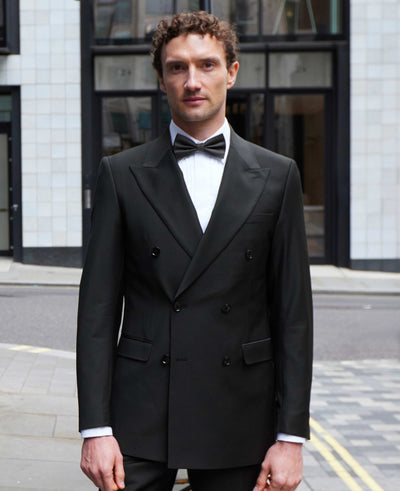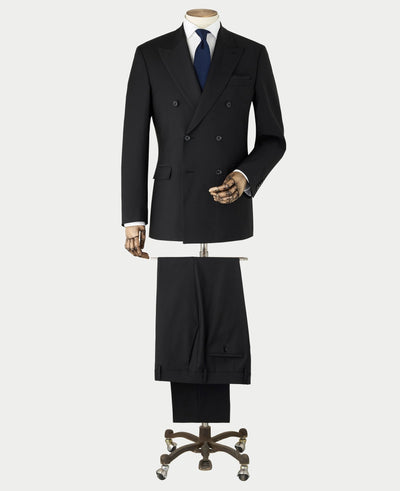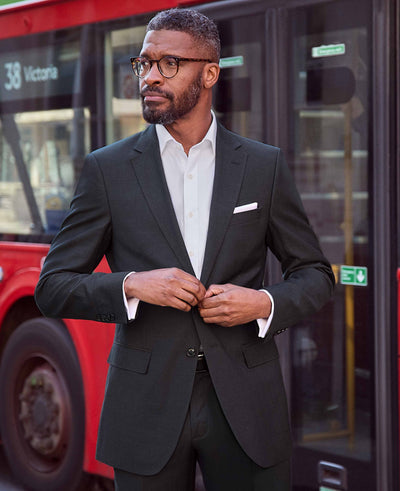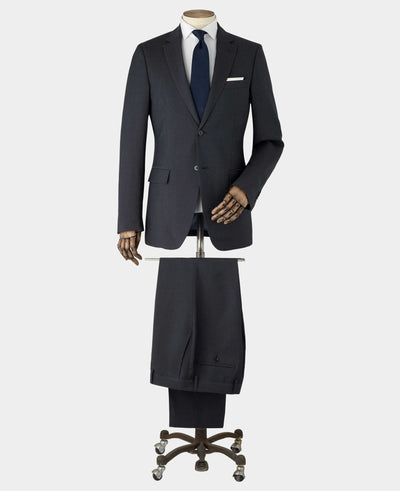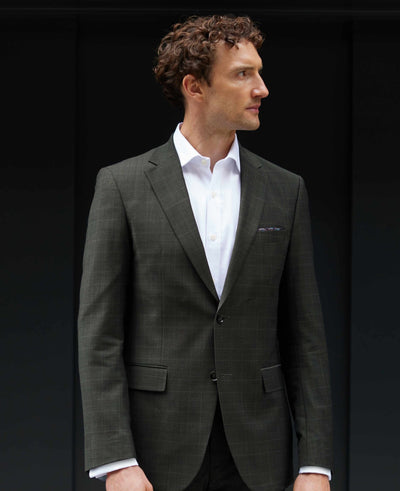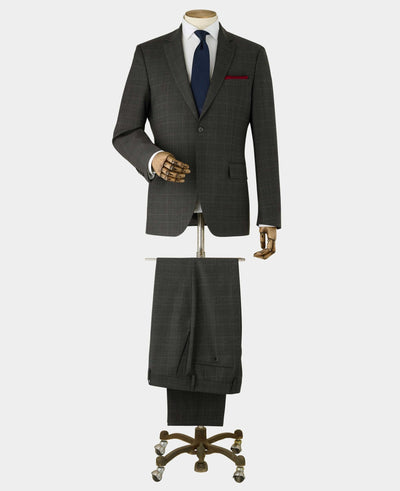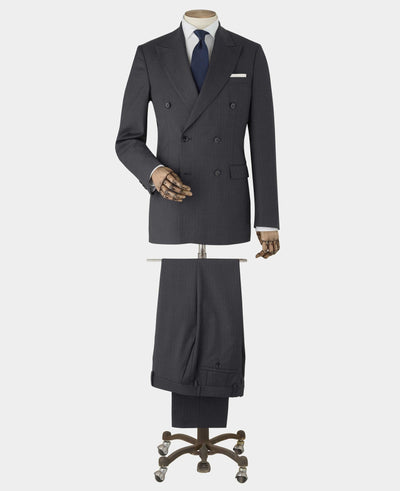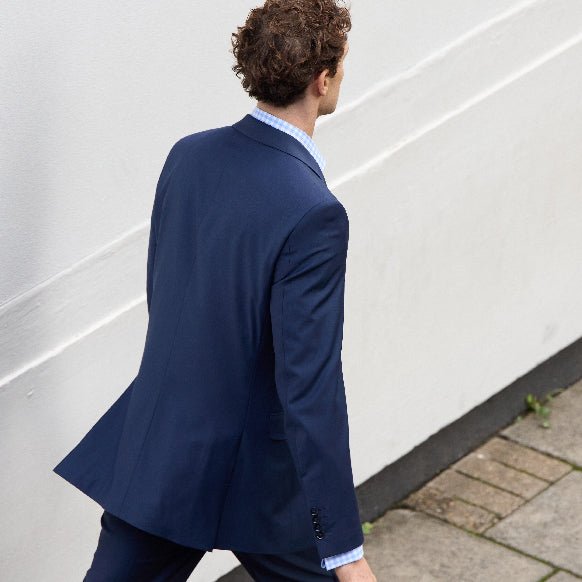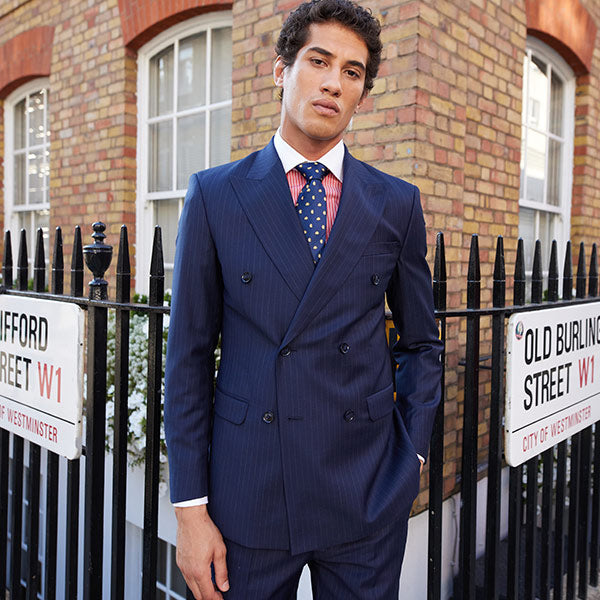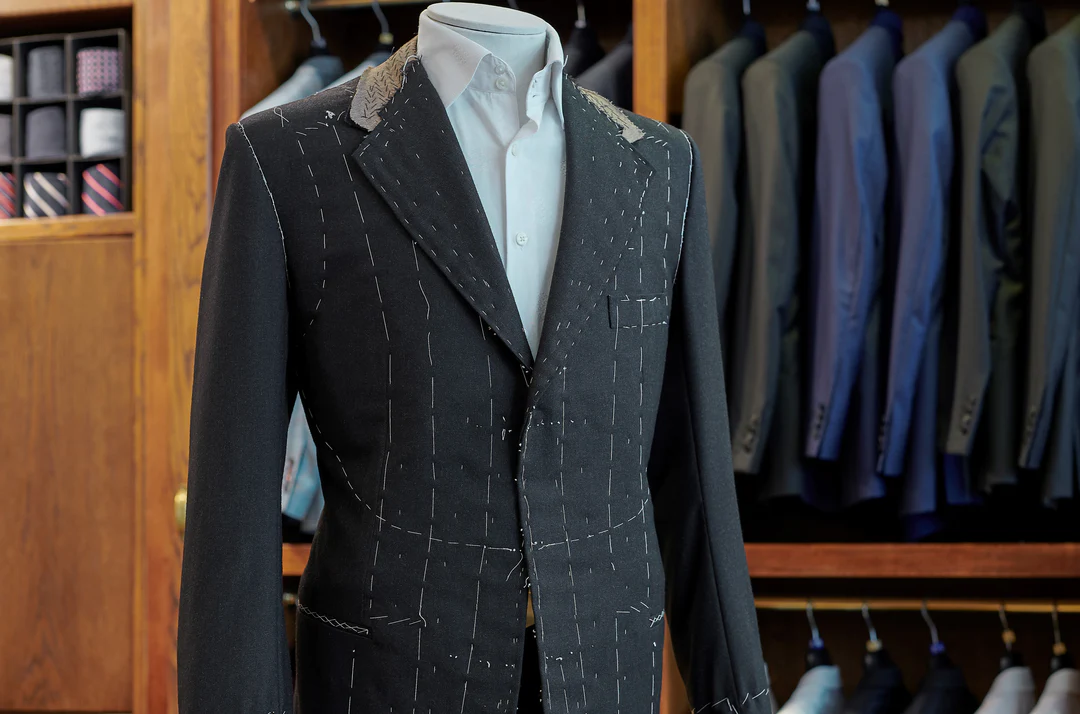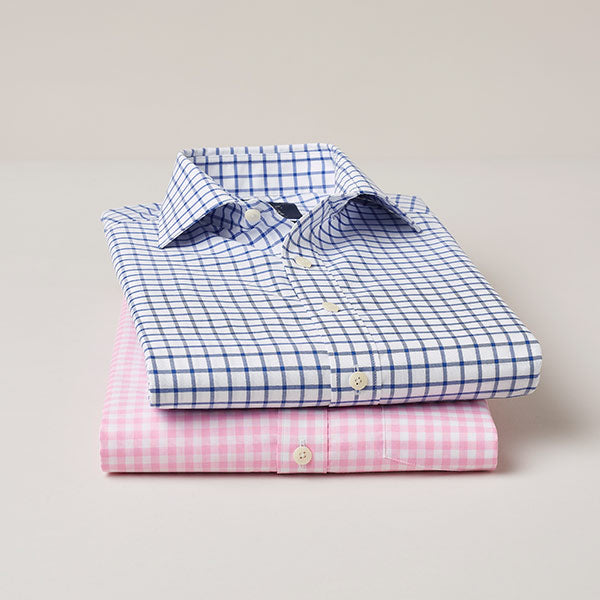Welcome to the only men's suit guide you'll ever need. Be it a wedding, a big meeting or simply an upgrade to your daily look, this guide has everything covered. Think of this as your style-savvy best friend, only tailored in wool and speaking fluent menswear.
In this all-in-one guide, we’ll walk you through everything from spotting a quality suit to deciphering lapel styles, comparing single vs. double-breasted jackets and selecting the right suit for every occasion. You’ll learn about suit fabrics and weights, how to care for your garments and how to avoid the most common (and cringe-worthy) suit mistakes.
How to Spot a Quality Suit
 Not all suits are created equal. A quality suit isn't just about the price tag; it's about craftsmanship, fit and fabric. Here's what to look for:
Not all suits are created equal. A quality suit isn't just about the price tag; it's about craftsmanship, fit and fabric. Here's what to look for:
1. Fit is King
- Shoulders: The suit should hug your shoulders without overhang.
- Jacket Length: It should cover your seat (aka your backside).
- Sleeve Length: A half-inch of shirt cuff should peek out.
2. Fabric Fundamentals
- Wool is the gold standard. Look for 100% wool or wool blends for breathability and drape. Blends with a touch of stretch offer added comfort and ease of movement, without sacrificing quality or shape.
- Super Numbers: Higher doesn’t always mean better. Super 100s to 120s offer a great balance of softness and durability.
- Weight: A medium-weight suit (around 280-320 gsm) works year-round.
3. Lining & Stitching
- Half or full canvas linings indicate great quality (and shape retention).
- Uncanvassed (fused) suits have their place too: they’re more affordable, lighter, and ready to wear straight off the hanger. Ideal if you want a clean, modern silhouette without the break-in period.
- Look inside: Neat, even stitching = a well-made suit.
Should You Remove Suit Stitching?
Ah, the age-old question. The short answer: yes, but only certain ones.
Temporary stitching is sometimes added to keep things in place during shipping. Once you're ready to wear the suit, remove:
- The X-shaped stitches on the back vent(s)
- The threads across the pockets
- The label stitched on the sleeve (this one’s a dead giveaway)
Leave the inner linings alone — they're meant to stay.
Suit Weights Explained: GSM Edition
 Suit weight matters, a lot. Instead of ounces, let’s talk GSM (grams per square metre):
Suit weight matters, a lot. Instead of ounces, let’s talk GSM (grams per square metre):
Heavier fabrics drape beautifully and resist wrinkles, but can get toasty. Lighter suits are breathable but may not hold structure as well.
| Weight Type | GSM Range | Best For |
|---|---|---|
| Lightweight | 190-250gsm | Summer, warm climates |
| Midweight | 260-320gsm | Year-round wear |
| Heavyweight | 330+gsm | Winter, colder regions |
How to Take Care of Your Suit

Even the finest suit won’t stay sharp forever without a little TLC. Taking proper care of your suit isn’t just about maintaining appearances, it’s about preserving your investment. With the right care, your suit will look just as good on its hundredth wear as it did on the first. Here's how to keep it crisp, clean and ready to impress:
Cleaning & Maintenance
- Dry clean sparingly: 2-3 times a year max.
- Spot clean minor stains with a damp cloth.
Brushing & Steaming
- Use a clothes brush to remove lint and dirt.
- Steam, don’t iron — it preserves fabric shape and reduces shine.
Storage Tips
- Hang on a broad, wooden hanger.
- Use a breathable garment bag.
- Avoid overcrowding your closet to maintain the suit’s form.
Pro tip: Rotate suits to let the fabric rest and regain shape.
What to Wear With a Suit
A great suit is only half the battle. The accessories and accompaniments matter too.
Shirts
- White or light blue: Classic and versatile.
- Avoid overly bold patterns unless you're confident.
Ties
- Match the width of your tie to your lapel.
- Consider textured in winter, lightweight in summer.
Cufflinks & Pocket Squares
- Cufflinks add subtle flair. Keep them elegant, not flashy.
- Pocket squares should complement (not match) your tie.
Shoes & Belts
- Stick to leather in black or brown.
- Match your belt to your shoes.
How to Spruce Up Your Suit (Without Buying a New One)
Your current suit might just need a little TLC. Here are a few quick upgrades:
- Tailoring: Get it nipped and tucked by a pro. Our team at Custom Made can help you out.
- Swap the buttons: Horn or mother-of-pearl buttons can elevate the look.
- Add a waistcoat: Makes a simple suit two-piece sharp.
- Experiment with accessories: Think knit ties, bold socks or lapel pins.
Suit Lapels Explained

Lapels are one of the defining features of a suit jacket. They frame your face, influence the suit’s formality and subtly signal your style preferences. Choosing the right lapel can elevate your entire look, whether you're going for timeless elegance or something a bit more contemporary. Here's a breakdown of the key types and when to wear them:
Notch Lapel
- The most common type, found on single-breasted suits.
- Best for business and semi-formal occasions.
Peak Lapel
- Sharp, pointed lapels often seen on double-breasted jackets.
- Adds a touch of authority and style. Great for formal events.
Shawl Collar
- A smooth, rounded lapel with no notches.
- Most commonly seen on tuxedos. Think black-tie elegance.
Understanding the lapel type helps you choose the right level of formality and personal flair.
Single vs Double-Breasted Suits
Let’s break down the differences:
Single-Breasted Suits
- One row of buttons, simple front.
- Versatile and classic—great for all body types.
Double-Breasted Suits
- Two parallel columns of buttons.
- More formal, fashion-forward. Best suited to taller or leaner body types.
When to wear:
- Go single-breasted for daily wear and job interviews.
- Choose double-breasted for weddings, galas, or if you’re channeling 1920s sophistication.
Common Suit Mistakes (and How to Avoid Them)
Don’t let a great suit go to waste because of minor missteps. Here are classic suit mistakes and how to dodge them:
- Leaving stitching on vents and pockets
- Wearing mismatched accessories
- Buttoning the bottom button on a two-button jacket (don’t do it!)
- Extra long trousers that puddle at the ankle
- Poor fit across the shoulders or chest
- Wearing shiny, cheap shoes with a luxury suit
- Over-accessorising – Keep it sleek and subtle.
Best Suits for Different Occasions

Not every suit is cut from the same cloth. The perfect men's suit depends not just on your body shape or fabric preference, but also the occasion. From saying 'I do' to sealing the deal or attending a black-tie soirée, here’s how to make sure your suit suits the moment:
Weddings
- Stick with navy, charcoal or light grey.
- Add a waistcoat for extra formality.
Job Interviews
- Conservative colours like charcoal or navy.
- Pair with a crisp white or light blue shirt.
Business Events
- A midweight wool suit in a neutral color.
- Add subtle patterns (e.g., faint checks or pinstripes) for personality.
Black-Tie Affairs
- Tuxedo or dinner suit.
- Shawl collar or peak lapel, black bow tie, polished shoes.
Frequently Asked Questions
How many suits should I own?
Start with three: navy, charcoal and light grey. These are versatile and cover all bases.
Can I machine wash a suit?
No. Always dry clean or spot clean.
How should a suit feel?
Comfortable, not restrictive. If you can’t hug someone comfortably, it’s too tight.
Is it OK to wear brown shoes with a navy suit?
Absolutely. Just make sure the browns aren’t too light.
Final Stitch
Wearing a suit isn’t just about looking good, it’s about feeling confident. No matter if you're a seasoned suit wearer or stepping into tailoring for the first time, remember this: fit, fabric and finish make all the difference.
 NEW ARRIVALS
NEW ARRIVALS


